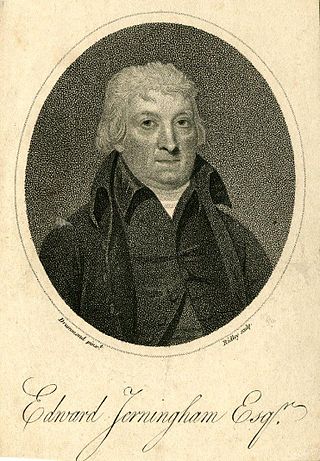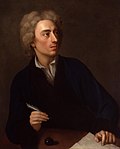
An epigram is a brief, interesting, memorable, and sometimes surprising or satirical statement. The word is derived from the Greek ἐπίγραμμα epígramma "inscription" from ἐπιγράφειν epigráphein "to write on, to inscribe", and the literary device has been employed for over two millennia.
A heroic couplet is a traditional form for English poetry, commonly used in epic and narrative poetry, and consisting of a rhyming pair of lines in iambic pentameter. Use of the heroic couplet was pioneered by Geoffrey Chaucer in the Legend of Good Women and the Canterbury Tales, and generally considered to have been perfected by John Dryden and Alexander Pope in the Restoration Age and early 18th century respectively.

Thomas Gray was an English poet, letter-writer, classical scholar, and fellow at Pembroke College, Cambridge. He is widely known for his Elegy Written in a Country Churchyard, published in 1751.

Alexander Pope was an English poet, translator, and satirist of the Enlightenment era who is considered one of the most prominent English poets of the early 18th century. An exponent of Augustan literature, Pope is best known for his satirical and discursive poetry including The Rape of the Lock, The Dunciad, and An Essay on Criticism, and for his translations of Homer.

John Dryden was an English poet, literary critic, translator, and playwright who in 1668 was appointed England's first Poet Laureate.

William Cowper was an English poet and Anglican hymnwriter. One of the most popular poets of his time, Cowper changed the direction of 18th-century nature poetry by writing of everyday life and scenes of the English countryside. In many ways, he was one of the forerunners of Romantic poetry. Samuel Taylor Coleridge called him "the best modern poet", whilst William Wordsworth particularly admired his poem "Yardley-Oak".

The term Metaphysical poets was coined by the critic Samuel Johnson to describe a loose group of 17th-century English poets whose work was characterised by the inventive use of conceits, and by a greater emphasis on the spoken rather than lyrical quality of their verse. These poets were not formally affiliated and few were highly regarded until 20th century attention established their importance.
In Latin literature, Augustan poetry is the poetry that flourished during the reign of Caesar Augustus as Emperor of Rome, most notably including the works of Virgil, Horace, and Ovid. In English literature, Augustan poetry is a branch of Augustan literature, and refers to the poetry of the 18th century, specifically the first half of the century. The term comes most originally from a term that George I had used for himself. He saw himself as an Augustus. Therefore, the British poets picked up that term as a way of referring to their endeavours, for it fit in another respect: 18th-century English poetry was political, satirical, and marked by the central philosophical problem of whether the individual or society took precedence as the subject of the verse.

An Essay on Criticism is one of the first major poems written by the English writer Alexander Pope (1688–1744), published in 1711. It is the source of the famous quotations "To err is human; to forgive, divine", "A little learning is a dang'rous thing", and "Fools rush in where angels fear to tread".
Francis Fawkes (1720–1777) was an English poet and translator. He translated works by Anacreon, Sappho and other classical authors, modernised parts of the poems of Gavin Douglas, and was the author of the well-known song, The Brown Jug, and of two poems, Bramham Park and Partridge Shooting. His translation of the Argonautica in rhymed couplets appeared in 1780.

Eloisa to Abelard is a verse epistle by Alexander Pope that was published in 1717 and based on a well-known medieval story. Itself an imitation of a Latin poetic genre, its immediate fame resulted in a large number of English imitations throughout the rest of the century and other poems more loosely based on its themes thereafter. Translations of varying levels of faithfulness appeared across Europe, starting in the 1750s and reaching a peak towards the end of the 18th century and the start of the 19th. These were in the vanguard of the shift away from Classicism and towards the primacy given emotion over reason that heralded Romanticism. Artistic depictions of the poem's themes were often reproduced as prints illustrating the poem; there were also paintings in France of the women readers of the amorous correspondence between the lovers.

Elegy Written in a Country Churchyard is a poem by Thomas Gray, completed in 1750 and first published in 1751. The poem's origins are unknown, but it was partly inspired by Gray's thoughts following the death of the poet Richard West in 1742. Originally titled Stanzas Wrote in a Country Church-Yard, the poem was completed when Gray was living near the Church of St Giles, Stoke Poges. It was sent to his friend Horace Walpole, who popularised the poem among London literary circles. Gray was eventually forced to publish the work on 15 February 1751 in order to preempt a magazine publisher from printing an unlicensed copy of the poem.
Leonard Welsted was an English poet and "dunce" in Alexander Pope's writings. Welsted was an accomplished writer who composed in a relaxed, light hearted vein. He was associated with Whig party political figures in his later years, but he was tory earlier, and, in the age of patronage, this seems to have been more out of financial need than anything else.
Nationality words link to articles with information on the nation's poetry or literature.
Nationality words link to articles with information on the nation's poetry or literature.
Decasyllabic quatrain is a poetic form in which each stanza consists of four lines of ten syllables each, usually with a rhyme scheme of AABB or ABAB. Examples of the decasyllabic quatrain in heroic couplets appear in some of the earliest texts in the English language, as Geoffrey Chaucer created the heroic couplet and used it in The Canterbury Tales. The alternating form came to prominence in late 16th-century English poetry and became fashionable in the 17th century when it appeared in heroic poems by William Davenant and John Dryden. In the 18th century famous poets such as Thomas Gray continued to use the form in works such as "Elegy Written in a Country Churchyard". Shakespearean Sonnets, comprising 3 quatrains of iambic pentameter followed by a final couplet, as well as later poems in blank verse have displayed the various uses of the decasyllabic quatrain throughout the history of English Poetry.
"Monody on the Death of Chatterton" was composed by Samuel Taylor Coleridge in 1790 and was rewritten throughout his lifetime. The poem deals with the idea of Thomas Chatterton, a poet who committed suicide, as representing the poetic struggle.

Poems on Various Subjects, Religious and Moral by Phillis Wheatley, Negro Servant to Mr. John Wheatley, of Boston, in New England is a collection of 39 poems written by Phillis Wheatley, the first professional African-American woman poet in America and the first African-American woman whose writings were published.

Iambus or iambic poetry was a genre of ancient Greek poetry that included but was not restricted to the iambic meter and whose origins modern scholars have traced to the cults of Demeter and Dionysus. The genre featured insulting and obscene language and sometimes it is referred to as "blame poetry". For Alexandrian editors, however, iambus signified any poetry of an informal kind that was intended to entertain, and it seems to have been performed on similar occasions as elegy even though lacking elegy's decorum. The Archaic Greek poets Archilochus, Semonides and Hipponax were among the most famous of its early exponents. The Alexandrian poet Callimachus composed "iambic" poems against contemporary scholars, which were collected in an edition of about a thousand lines, of which fragments of thirteen poems survive. He in turn influenced Roman poets such as Catullus, who composed satirical epigrams that popularized Hipponax's choliamb. Horace's Epodes on the other hand were mainly imitations of Archilochus and, as with the Greek poet, his invectives took the forms both of private revenge and denunciation of social offenders.

Edward Jerningham was a poet who moved in high society during the second half of the 18th century. Born at the family home of Costessey Park in 1737, he died in London on 17 November 1812. A writer of liberal views, he was savagely satirised later in life.














